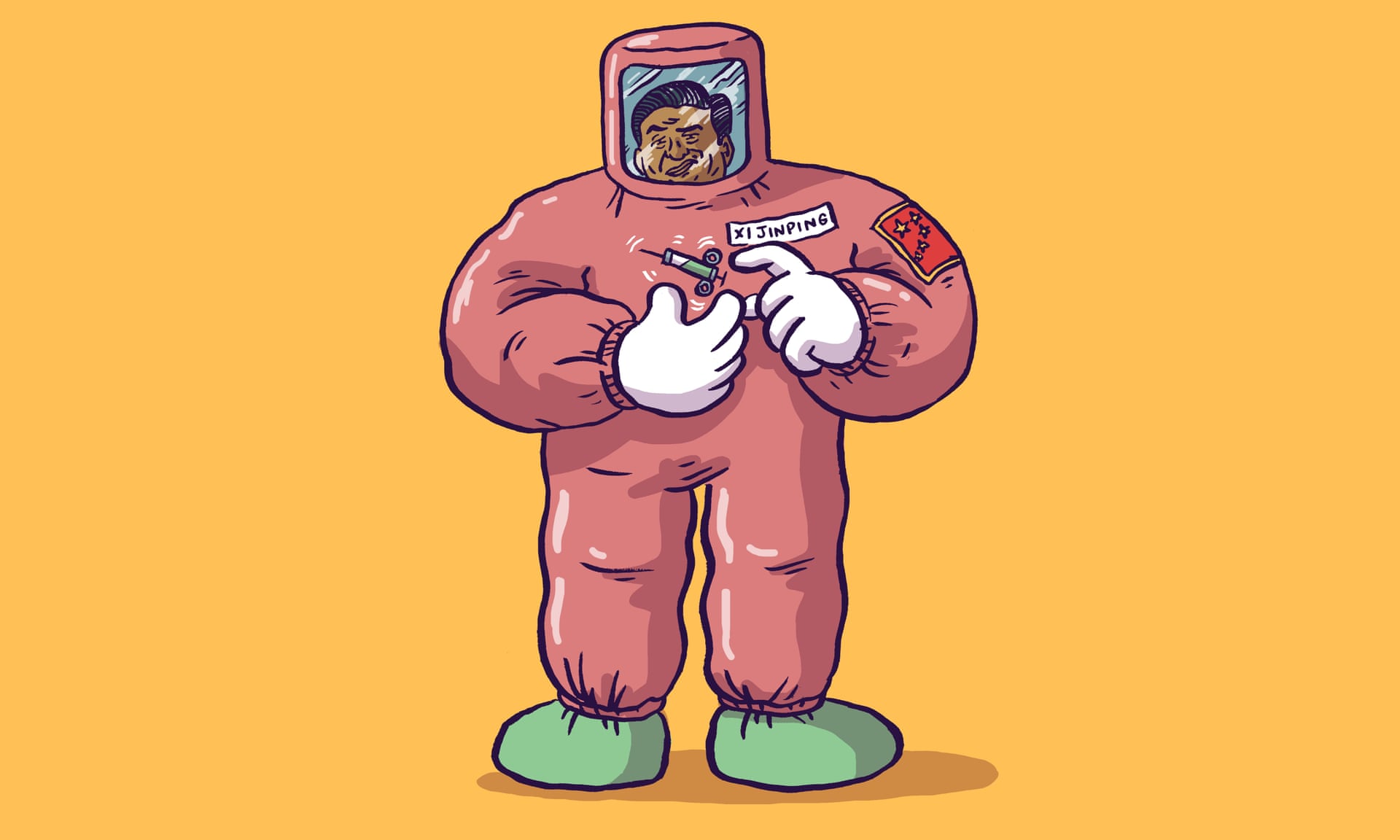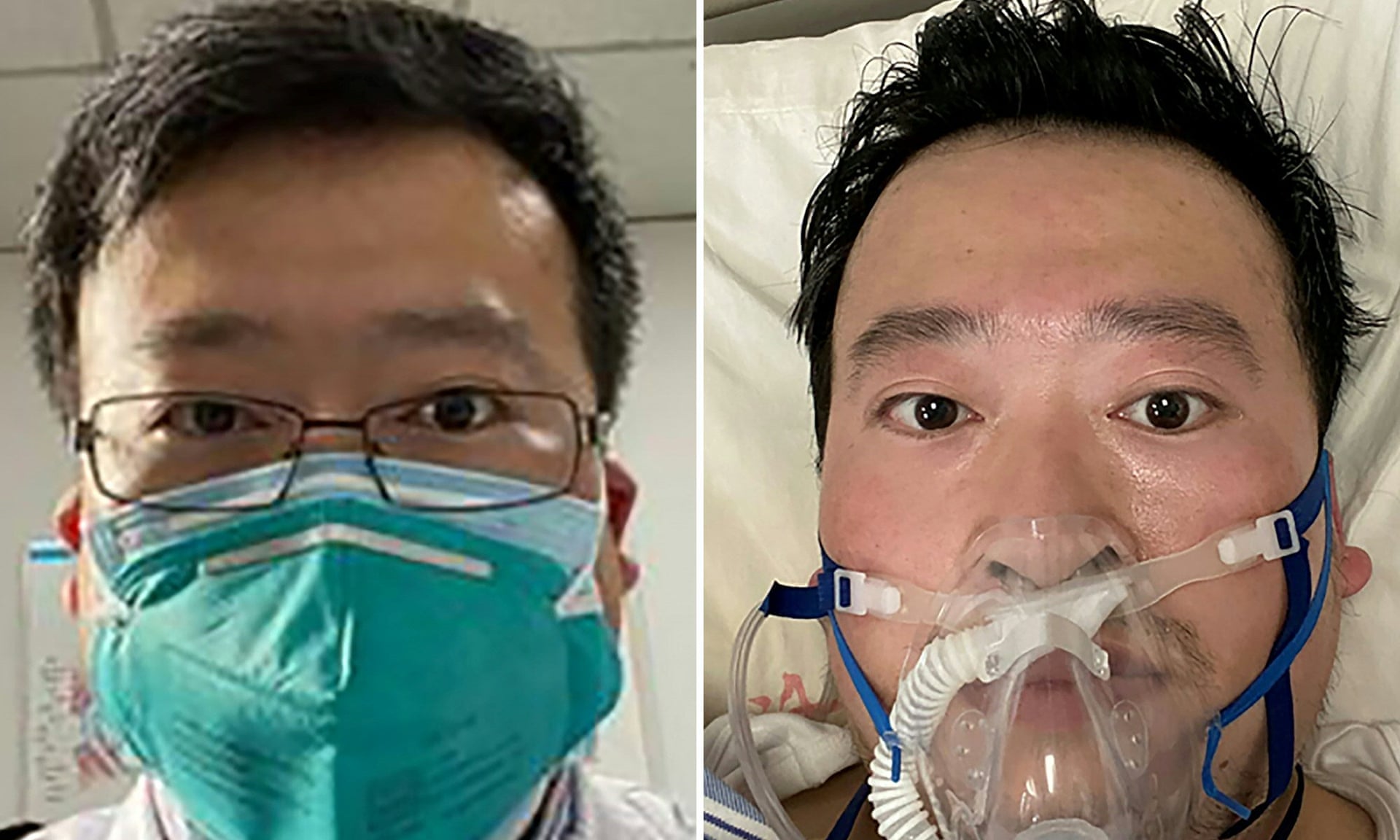By Richard McGregor

Soon after Li Wenliang succumbed to the Chinese coronavirus in Wuhan early on Friday morning, a drawing of the Chinese doctor appeared on the internet, sleeping and being hoisted gently into heaven by an angel.
From late in the evening until dawn yesterday, Chinese citizens stayed up, posting emotional tributes and venting their fury at the government over the treatment of the 34-year-old ophthalmologist, who had tried to warn the authorities about the virus in late December, only to be told by the police to shut up.
The authorities, seemingly in a panic at the outpouring of grief and anger, announced that Li was still being treated before reposting confirmation of his death hours later.
“You think we’ve all gone to sleep?” posted one netizen?
“No. We haven’t.”
In an interview with Chinese magazine Caixin before his death, Li delivered his own verdict on the government’s handling of the issue: “I think there should be more than one voice in a healthy society.”
It is wise to be cautious about the political impact of a single event or, in this case, one person’s death, especially in China, which is ruled by an opaque Communist party.
In an interview with Chinese magazine Caixin before his death, Li delivered his own verdict on the government’s handling of the issue: “I think there should be more than one voice in a healthy society.”
It is wise to be cautious about the political impact of a single event or, in this case, one person’s death, especially in China, which is ruled by an opaque Communist party.
After all, can a virus that has so far claimed more than 900 lives, fewer than in a normal flu season in many countries, really hold the future of China in its thrall?


The Chinese ophthalmologist Li Wenliang died from the Chinese coronavirus on 7 February. His early warnings about the outbreak were suppressed by the police.
However, the fallout from the spread of the deadly coronavirus is already grim, most immediately in the form of a reeling Chinese economy that is having to temporarily sever supply lines to factories and retail outlets around the world.
China has been responsible for about one-third of global growth in recent years, a greater share than the US, and any slowdown in its economy will be felt across the world.
But the greatest focus is on what Li alluded to when he complained about the country being ruled by “one voice”, which Chinese people would immediately recognise as a barb directed at Xi Jinping.
But the greatest focus is on what Li alluded to when he complained about the country being ruled by “one voice”, which Chinese people would immediately recognise as a barb directed at Xi Jinping.
Xi has swept all enemies, real and imagined, aside since taking over as Communist party chief in late 2012 and made many more along the way.
Powerful families and moneyed interests toppled by his relentless anti-corruption campaign will never forgive him and are lying in wait for revenge.
Powerful families and moneyed interests toppled by his relentless anti-corruption campaign will never forgive him and are lying in wait for revenge.
Equally, many of the technocratic elite have been alienated by his illiberal economic policies and his assertiveness overseas, which they blame for triggering a concerted pushback in Washington.
Much of their anger was captured in a single moment that embodied their fears that Xi is taking the country backwards – his decision in early 2018 to do away with term limits and make himself leader in perpetuity.
Difficult as it is to measure public opinion in China, it is doubtless true that for many Chinese, the anti-corruption campaign – Xi’s key initiative – has been highly popular.
Much of their anger was captured in a single moment that embodied their fears that Xi is taking the country backwards – his decision in early 2018 to do away with term limits and make himself leader in perpetuity.
Difficult as it is to measure public opinion in China, it is doubtless true that for many Chinese, the anti-corruption campaign – Xi’s key initiative – has been highly popular.
With the economy growing steadily before the virus hit, most Chinese are also still seeing their living standards rise.
But Li’s death and the mismanagement of the crisis have done more than just crystallise the elite’s dislike of Xi.
But Li’s death and the mismanagement of the crisis have done more than just crystallise the elite’s dislike of Xi.
Over time, they could direct the anger of the wider populace against him as well.
“In previous crises, like the Wenchuan earthquake [in Sichuan in 2008], the vast majority of Chinese citizens were spectators commenting on an event that angered them but was far away,” said Bill Bishop, of Sinocism, a Washington-based China newsletter.
“In previous crises, like the Wenchuan earthquake [in Sichuan in 2008], the vast majority of Chinese citizens were spectators commenting on an event that angered them but was far away,” said Bill Bishop, of Sinocism, a Washington-based China newsletter.
“In this epidemic, no one is just a spectator – everyone is directly impacted.”
The spread of the virus, most likely starting from live animals in the Wuhan wet market late last year, has showcased both the party state’s formidable strengths and corrosive weaknesses.
The initial coverage of the virus focused on the authorities’ abrupt order, issued at 2am on January 23, to quarantine Wuhan, a city of 11 million in central Hubei province.
“To my knowledge, trying to contain a city of 11 million is new to science,” said Gauden Galea, a World Health Organization official, who seemed both in awe at the order and wryly unsure whether it would work.
Once areas surrounding Wuhan were pulled inside the sealed-off zone days later, a total of 35 million people had been effectively put into lockdown with the stroke of an administrative pen.
The power of the Chinese state and its ability to mobilise resources overnight has long been admired by foreigners, be it in building a hospital in barely a week, as in Wuhan, or enforcing a cordon sanitaire containing tens of millions of people.
The spread of the virus, most likely starting from live animals in the Wuhan wet market late last year, has showcased both the party state’s formidable strengths and corrosive weaknesses.
The initial coverage of the virus focused on the authorities’ abrupt order, issued at 2am on January 23, to quarantine Wuhan, a city of 11 million in central Hubei province.
“To my knowledge, trying to contain a city of 11 million is new to science,” said Gauden Galea, a World Health Organization official, who seemed both in awe at the order and wryly unsure whether it would work.
Once areas surrounding Wuhan were pulled inside the sealed-off zone days later, a total of 35 million people had been effectively put into lockdown with the stroke of an administrative pen.
The power of the Chinese state and its ability to mobilise resources overnight has long been admired by foreigners, be it in building a hospital in barely a week, as in Wuhan, or enforcing a cordon sanitaire containing tens of millions of people.
But it is the chronic weaknesses in the political system that exacerbated the spread of the virus in the first place.The authoritarian strictures of the Chinese party state place a premium on the control of information in the name of maintaining stability.
In such a system, lower-level officials have no incentive to report bad news up the line.
Under Xi, such restrictions have grown tighter.
In Wuhan, Li and seven of his fellow doctors had been talking among themselves in an internet chat group about a new cluster of viral infections.
In Wuhan, Li and seven of his fellow doctors had been talking among themselves in an internet chat group about a new cluster of viral infections.
They stopped after being warned by police.
By the time the authorities reacted and quarantined the city, it was too late.
Li was neither a dissident nor a pro-democracy activist seeking to overthrow the Communist party.
Li was neither a dissident nor a pro-democracy activist seeking to overthrow the Communist party.
But he was risking jail to even discuss the virus.
For in Xi’s China, the professional classes – doctors, lawyers, journalists and the like – all must subsume their skills and ethics to the political directives of the moment.
During the crisis, Xi has maintained an unusually low profile, perhaps because he doesn’t want to step in publicly until it is clear the health authorities have gained control of the situation and new infections start to fall.
For a man whose propaganda apparatus has recently begun to promote him as the “people’s leader”, it has been a humbling moment.
During the crisis, Xi has maintained an unusually low profile, perhaps because he doesn’t want to step in publicly until it is clear the health authorities have gained control of the situation and new infections start to fall.
For a man whose propaganda apparatus has recently begun to promote him as the “people’s leader”, it has been a humbling moment.
Aucun commentaire:
Enregistrer un commentaire